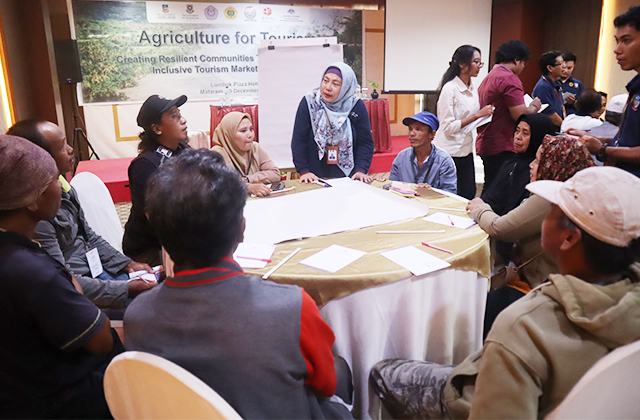Unram CESFARMS Workshop: Building Resilient Communities in Indonesia through Inclusive Tourism Market for Smallholder Farmers

Mataram, University of Mataram – The Research Team of The Center for Sustainable Farm Systems University of Mataram (CESFARMS Unram) held a workshop with business practitioners in agriculture and livestock on Lombok Island, with the theme “Creating Resilient Communities in Indonesia Through Smallholder-Inclusive Tourism Markets” on Tuesday, December 10, 2024 at the Lombok Plaza Hotel.
This workshop is the second activity in 2024 after the signing of the MoU in 2023 between the Australian research cooperation agency for agriculture, Australian Center for International Agricultural Research (ACIAR), with the University of Mataram (Unram), Udayana University (Unud), Sam Ratulangi University (Unsrat), and the National Research and Innovation Agency (BRIN).
The workshop was officially opened by the Rector of Unram, Prof. Ir. Bambang Hari Kusumo, M.Agr.St., Ph.D. accompanied by the Ag4 Tourism Research Team consisting of Prof. Ir. Sri Widyastuti, Ph.D.; Prof. Dr. Ir. Sukartono, M.Agr.; Prof. Dahlanuddin, M.Rur.Sc., Ph.D.; Ir. I G.L. Parta Tanaya, M.App.Sc., Ph.D.; also researchers from the National Research and Innovation Agency (BRIN), Dr. Ir. Tanda Sahat Panjaitan, M.Sc. and Dr. Drh. Nurul Hilmiati, M.Sc.
The ACIAR Ag4T Project Leader, Jeremy Badgery-Parker from the University of Adelaide Australia, as well as 40 invited guests from farming businesses such as kale, pineapple, chicken farmers and traders of these three commodities were present.
The synergy between academics and farming and livestock business actors is able to create superior products based on agriculture and livestock that not only increase farmers’ income, but also attract tourists through agro-tourism and regional culinary specialties. With close collaboration, the agriculture and tourism sectors can develop sustainably, providing economic and social benefits to local communities.
Rector of Unram, Prof. Ir. Bambang Hari Kusumo, M.Agr.St., Ph.D. in his speech said, “This workshop is a means to start a synergy between academics and business actors in the field of progressive agriculture and animal science to overcome problems related to the supply of agricultural products to support tourism.”
“Through innovation and academic research, improving the quality, quantity and sustainability of agricultural products by farmers, we can create a mutually beneficial ecosystem. This synergy not only strengthens the agriculture and tourism sectors but also contributes to the overall welfare of society,” said Prof. Bambang.
Issues in the supply chain of agricultural products to the hotel, restaurant and catering (horeca) sector are now a major concern, given the importance of ensuring a sustainable supply of quality food ingredients. Various challenges in the supply chain circulation threaten the efficiency and stability of supply, and impact the quality and price of products that reach the end consumer.
Along with the development of tourism and the increase in the number of tourist visits, it has brought its own consequences, especially in tourist destination areas and local communities. The presence of tourism is basically able to accelerate economic growth and provide employment, increase income, improve living standards, and stimulate productive sectors, especially the agrocomplex.
Prof. Ir. Sri Widyastuti, Ph.D. as the Head of the Unram Ag4T Team when starting the presentation emphasized that, “This collaboration is an important step towards economic sustainability and improving community welfare, the absorption of agricultural products by horeca can be significantly increased. This initiative not only strengthens the food supply chain but also supports local economic growth.”
Dr. Ir. Tanda Sahat Panjaitan, M.Si., researcher from BRIN, stated that the main problem faced by farmers and ranchers in supplying products to hotels, restaurants, and catering services is the instability of consistent quality and meeting high standards. Therefore, this workshop comes as a practical synergistic effort to answer the challenge of maintaining stable product quality.
“This step not only explores the problems at the farmer level, but also strengthens the local economy in supporting the welfare of farmers and breeders and advancing local tourism development,” said Ir. I.G.L. Parta Tanaya, M.App.Sc., Ph.D.
To overcome this problem, close collaboration between farmers and academics is needed to apply science and technology findings in effective education campaigns.
Local farmers, who often face challenges in reaching a wider market, are now getting support in the form of training on modern farming techniques and supply chain management. By adopting innovative farming techniques and building close partnerships with hotels, restaurants and caterers, farmers can ensure the supply of quality and diverse food ingredients.
In guiding the discussion in this workshop, Prof. Sukartono, revealed, “This Ag4T collaboration is to create a more efficient and sustainable value chain system. So it is hoped that through this workshop a very strategic step will be taken in exploring and finding a comprehensive solution formulation among farmers by combining academic expertise in research and technology, farmers’ experience in the field, insights from horeca to find a more integrated solution.”
This was added by Dr. Nurul Hilmiati from BRIN, “Collaborative business partnerships between local farmers and ranchers and tourism industry players and the use of science and technology are key in realizing effective synergies.”
Hasanur Basri, a chicken farmer, said, “Farmers face obstacles in the form of a long distribution chain that causes the high cost of sending DOC from Java to Lombok, so there is no price policy or price stability from the government. To overcome this, the government is expected to help build a feed mill in Lombok to reduce shipping costs.”
In addition, local chicken farmers also need government attention in the form of assistance and visits from extension officers to provide solutions to various technical problems, such as disease management and others.
At the end of the session, Prof. Ir. Dahlanuddin, M.Rur.Sc., Ph.D. concluded that, “This workshop is not only a means to explore problems at the grassroots. However, it will enable the application of science and technology findings in effective education campaigns, to improve product quality and meet the standards required by horeca, as pioneers of sustainability and support for the local economy, which can increase their attractiveness to tourists.”
